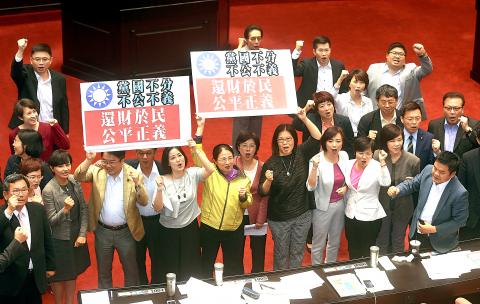An act to recover wrongfully paid government pensions was yesterday passed into law after a 10-year push, with former vice president Lien Chan (連戰) and prominent members of the Chinese Nationalist Party (KMT) to be asked to return some benefits.
The legislature approved the Act on the Settlement of the Combination of Years of Service in Public Sector and Political Organizations (公職人員年資併社團專職人員年資計發退離給與處理條例), which when promulgated requires people paid a pension for the time they spent working for the KMT and non-governmental organizations to return the excess payments within one year.
The act is expected to affect 381 former ministers, government officials and teachers, including Lien, former KMT vice chairman Jason Hu (胡志強) and former Examination Yuan president John Kuan (關中).

Photo: Fang Pin-chao, Taipei Times
Kuan has been overpaid about NT$10.11 million (US$335,301) and is obliged to pay it back, the Democratic Progressive Party (DPP) said.
Lien has been overpaid about NT$9.83 million; Hu has received NT$8.65 million; former Straits Exchange Foundation vice chairman Chiao Jen-ho (焦仁和) has received NT$3.73 million; former KMT vice chairman Lin Feng-cheng (林豐正) has received NT$1.09 million; former Judicial Yuan president Shih Chi-yang (施啟揚) has received NT$665,640; and former KMT chairman Wu Po-hsiung (吳伯雄) has received NT$171,360, the DPP said.
Their retirement benefits are to be adjusted by deducting the number of years they worked for the KMT or other political organizations from the number of years they worked in the public sector.
The Ministry of Civil Service is to announce the exact amount each person owes the state.
However, the act stipulates a pension floor of NT$25,000 per month to ensure basic living expenses for retirees. Those whose monthly pension is below the floor after adjustments will receive NT$25,000 per month.
The 381 retirees combined their political party and public sector service to qualify for government pensions because, in 1971, the Examination Yuan approved a regulation to allow KMT officials who held public office to combine years served as a civil servant with years worked as a party official.
A similar regulation was enacted for officials of the World League for Freedom and Democracy, the Asian Peoples’ Anti-Communist League, the National Development and Research Institute, the China Youth Corps, the Chinese Association for Relief and Ensuing Services and the Grand Alliance for China’s Reunification under the Three Principles of the People.
The regulations were abolished in 1987 and 2006 after government investigations determined that they violated the principle of equality.
However, KMT and party officials who had assumed government positions before the regulations were scrapped were still allowed to combine their years of service.
An investigation into the regulation was launched in 2005 during the administration of then-president Chen Shui-bian (陳水扁), and the DPP put forward a draft bill in 2007 to eliminate the practice, but the bill failed to pass the KMT-dominated legislature.

Right-wing political scientist Laura Fernandez on Sunday won Costa Rica’s presidential election by a landslide, after promising to crack down on rising violence linked to the cocaine trade. Fernandez’s nearest rival, economist Alvaro Ramos, conceded defeat as results showed the ruling party far exceeding the threshold of 40 percent needed to avoid a runoff. With 94 percent of polling stations counted, the political heir of outgoing Costa Rican President Rodrigo Chaves had captured 48.3 percent of the vote compared with Ramos’ 33.4 percent, the Supreme Electoral Tribunal said. As soon as the first results were announced, members of Fernandez’s Sovereign People’s Party

EMERGING FIELDS: The Chinese president said that the two countries would explore cooperation in green technology, the digital economy and artificial intelligence Chinese President Xi Jinping (習近平) yesterday called for an “equal and orderly multipolar world” in the face of “unilateral bullying,” in an apparent jab at the US. Xi was speaking during talks in Beijing with Uruguayan President Yamandu Orsi, the first South American leader to visit China since US special forces captured then-Venezuelan president Nicolas Maduro last month — an operation that Beijing condemned as a violation of sovereignty. Orsi follows a slew of leaders to have visited China seeking to boost ties with the world’s second-largest economy to hedge against US President Donald Trump’s increasingly unpredictable administration. “The international situation is fraught

MORE RESPONSIBILITY: Draftees would be expected to fight alongside professional soldiers, likely requiring the transformation of some training brigades into combat units The armed forces are to start incorporating new conscripts into combined arms brigades this year to enhance combat readiness, the Executive Yuan’s latest policy report said. The new policy would affect Taiwanese men entering the military for their compulsory service, which was extended to one year under reforms by then-president Tsai Ing-wen (蔡英文) in 2022. The conscripts would be trained to operate machine guns, uncrewed aerial vehicles, anti-tank guided missile launchers and Stinger air defense systems, the report said, adding that the basic training would be lengthened to eight weeks. After basic training, conscripts would be sorted into infantry battalions that would take

GROWING AMBITIONS: The scale and tempo of the operations show that the Strait has become the core theater for China to expand its security interests, the report said Chinese military aircraft incursions around Taiwan have surged nearly 15-fold over the past five years, according to a report released yesterday by the Democratic Progressive Party’s (DPP) Department of China Affairs. Sorties in the Taiwan Strait were previously irregular, totaling 380 in 2020, but have since evolved into routine operations, the report showed. “This demonstrates that the Taiwan Strait has become both the starting point and testing ground for Beijing’s expansionist ambitions,” it said. Driven by military expansionism, China is systematically pursuing actions aimed at altering the regional “status quo,” the department said, adding that Taiwan represents the most critical link in China’s